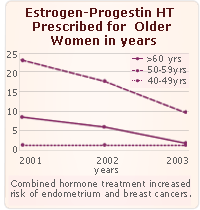The potential benefits of taking estrogen replacement therapy are many, especially during menopause for hot flashes relief, lowering the risks of heart disease and disease osteoporosis. However, taking estrogen hormones remains controversial since some studies have linked the treatment with an increased risk of endometrium and breast cancers.
Researchers from the National Cancer Institute (NCI) in Bethesda, Md., have found that combined estrogen-progestin replacement therapy is associated with a greater risk of breast cancer than estrogen alone. Both groups had a higher risk than non-users.

For decades, medical researchers already knew that estrogen replacement therapy alone can cause cancer of the endometrium (the lining of the uterus) when used for long terms. In the picture on the right you can see the exact location of the endometrium.
To counteract this damage, medical researchers try to neutralize estrogen side effects by complementing the therapy with progestin hormones.
Nonetheless, recent studies proposed that the estrogen-progestin regimen may be associated with greater increases in breast cancer risk than estrogen alone.
That is the reason why Doctor Catherine Schairer, PhD, of the NCI's Division of Cancer Epidemiology and Genetics and her colleagues performed a study to determine the real impact of the combined therapy.
They analyzed follow-up information from a subset of 46,355 participants in the Breast Cancer Detection Demonstration Project (BCDDP), a nationwide breast cancer screening program.
After adjusting all the data according to several subgroups (age, education, body mass index, history of mammography and age at menopause) and compared them with women who had not taken HRT, the authors obtained this interesting results:
- The longer women took hormone replacement therapy, the higher the risks of getting breast cancer
- Women who took estrogen-progestin during the last 4 years had a 40% higher risk of breast cancer than women who haven't used it.
- The risk of breast cancer increased by 1% for each year of use in women who has taken estrogen alone
- The risk of getting cancer increases 8% per year of use in women taking estrogen and progestin combined
These results complement other studies which suggest that women who take hormones for long terms to relieve menopausal symptoms are at increased risk of breast cancer.
This study suggests that estrogen-progestin may increase breast cancer risk beyond that of estrogen alone. However, Dr. Schairer said that more research is needed to make firm conclusions about hormone replacement therapy and breast cancer risk. “We need to evaluate longer-term use of estrogen in combination with progestin,” she said in the interview. Schairer added that it would be important to study different types of combination therapy. Among women who take both estrogen and progestin, not all take progestin on a daily basis.
“Women on hormone replacement therapy should be particularly careful. Regardless of which hormones they use”, Schairer said. “It's very important for all women to get periodic (breast cancer) screening.”